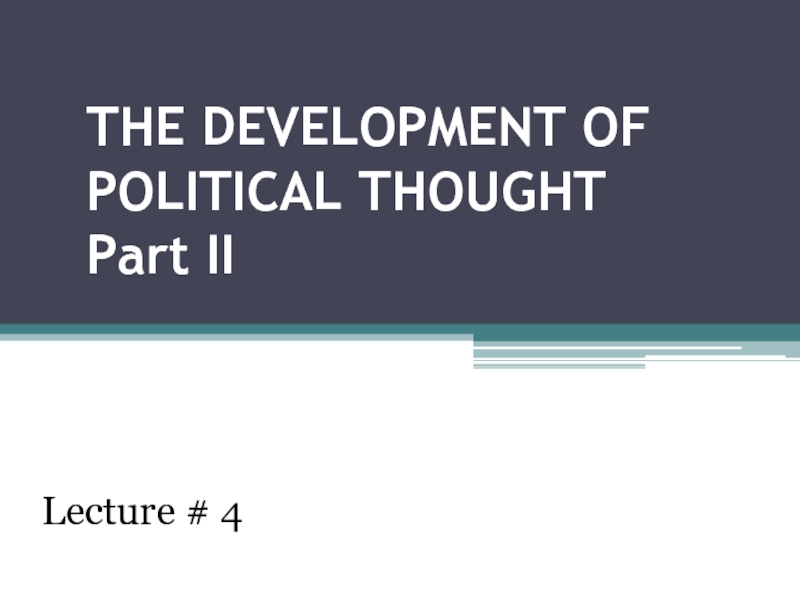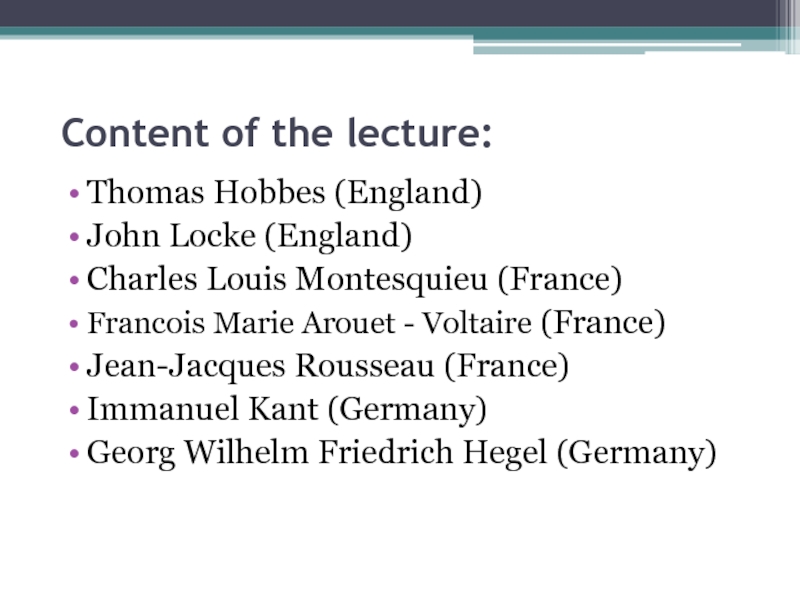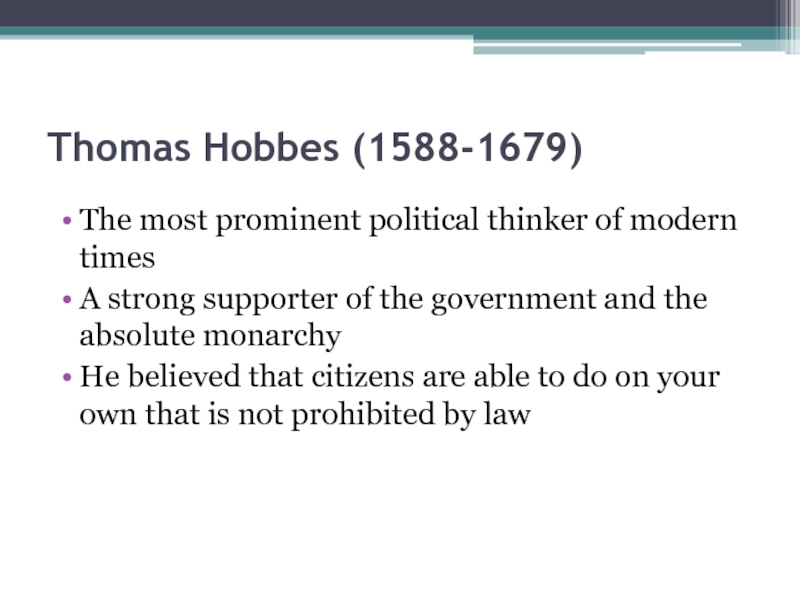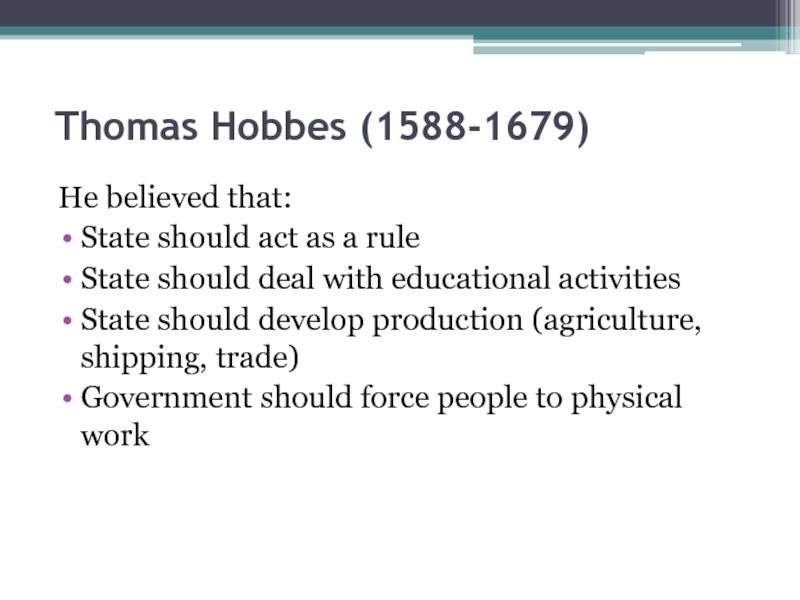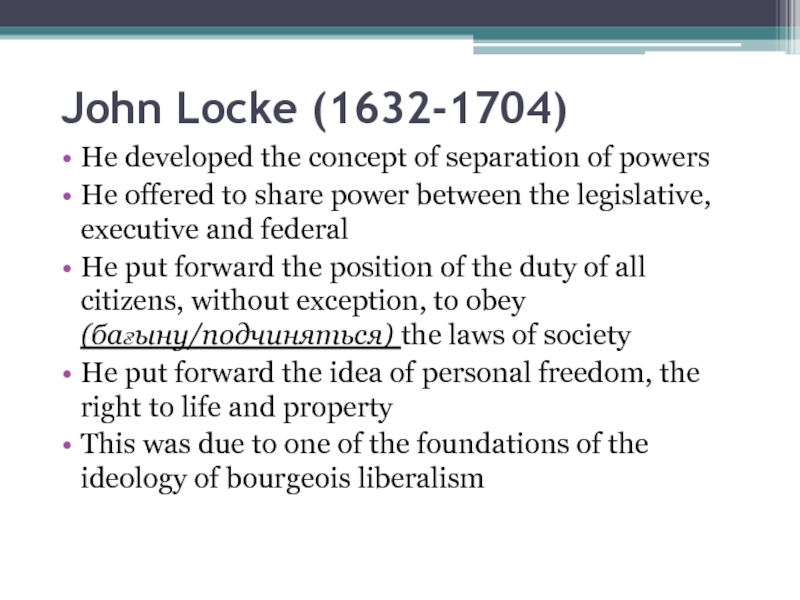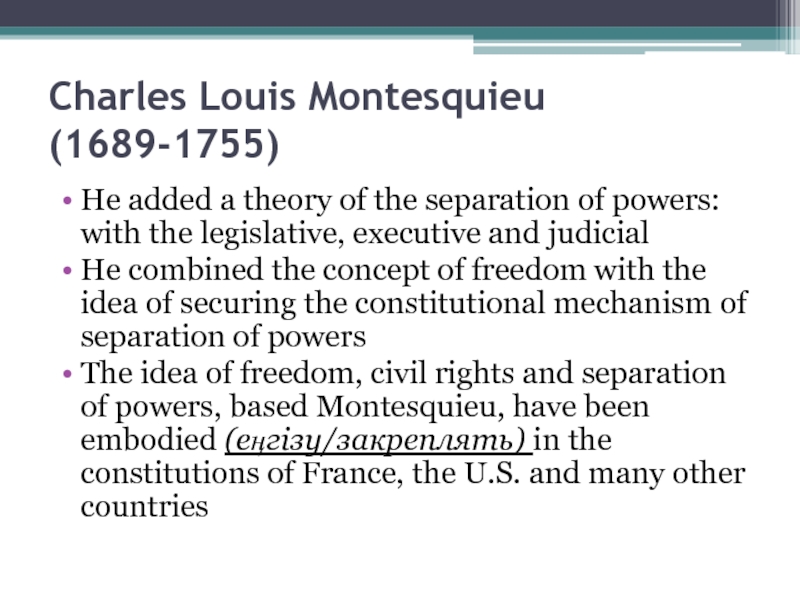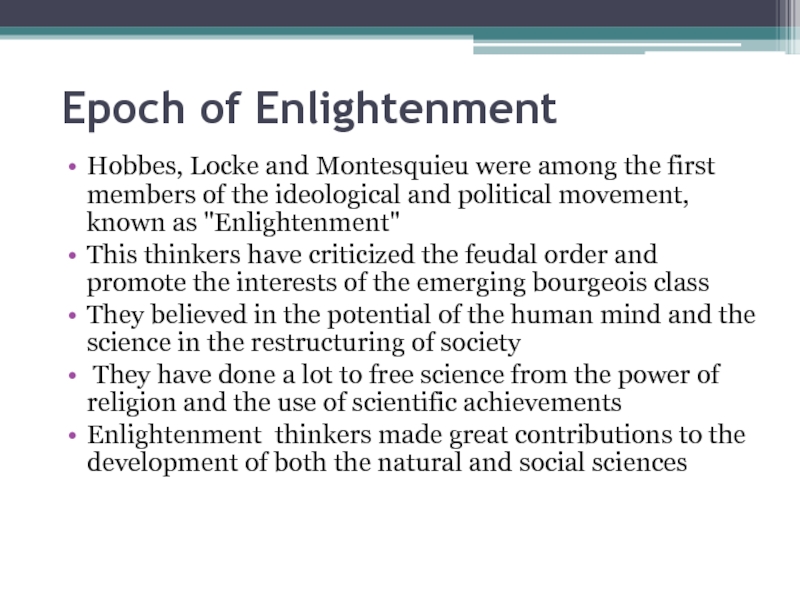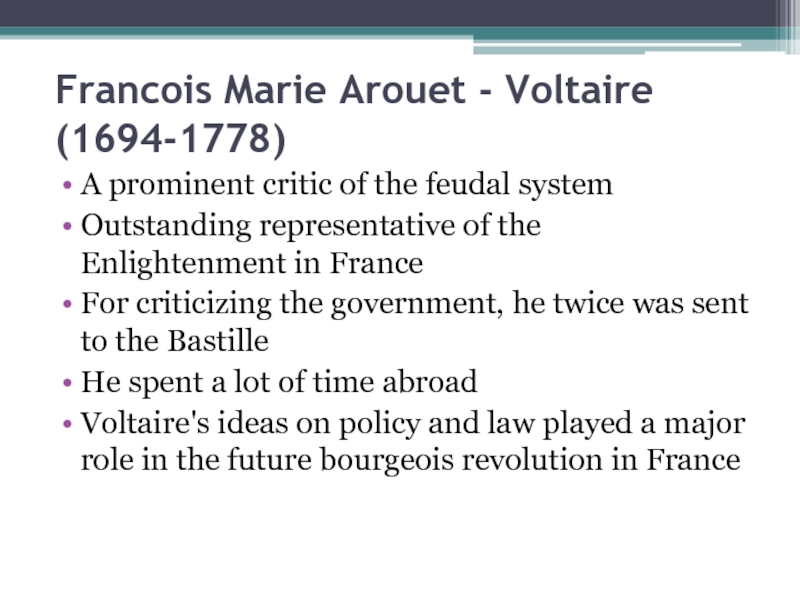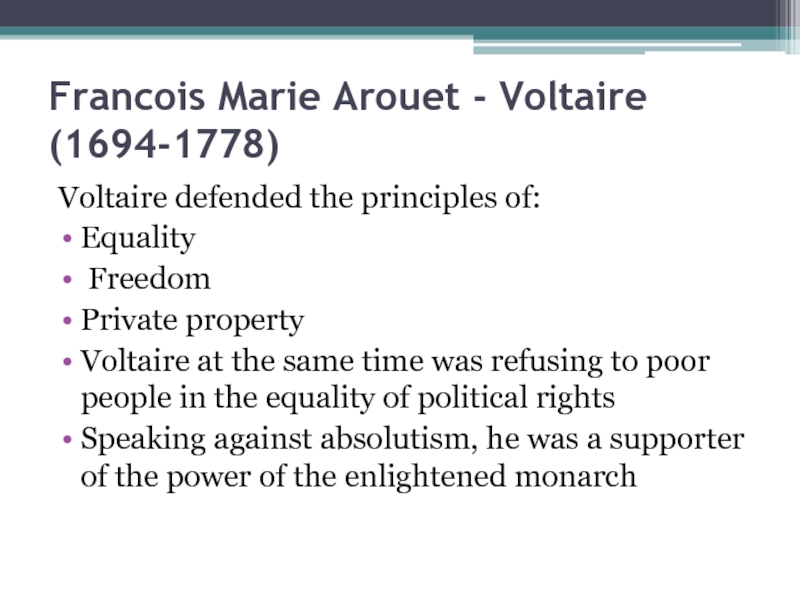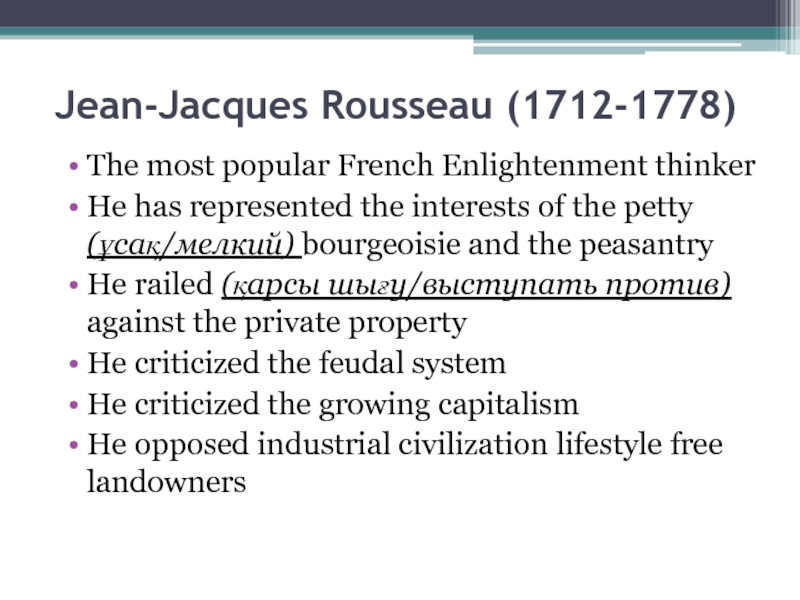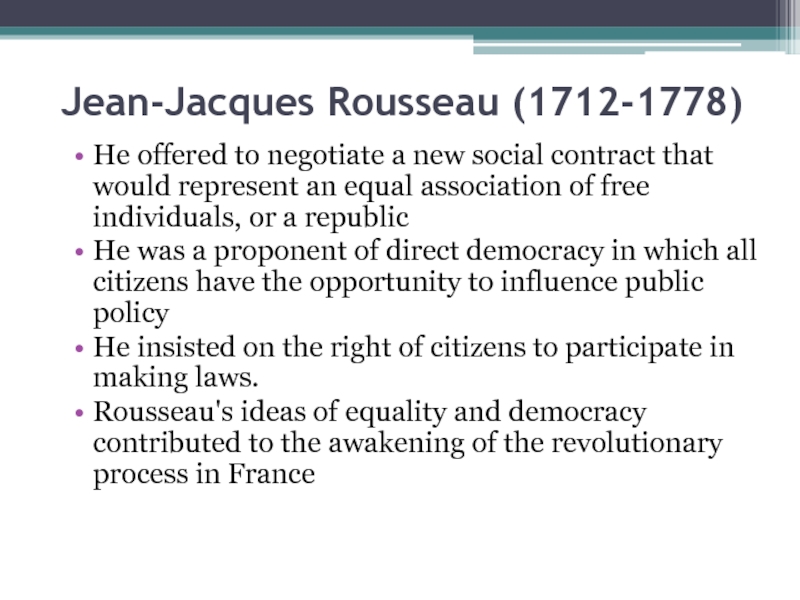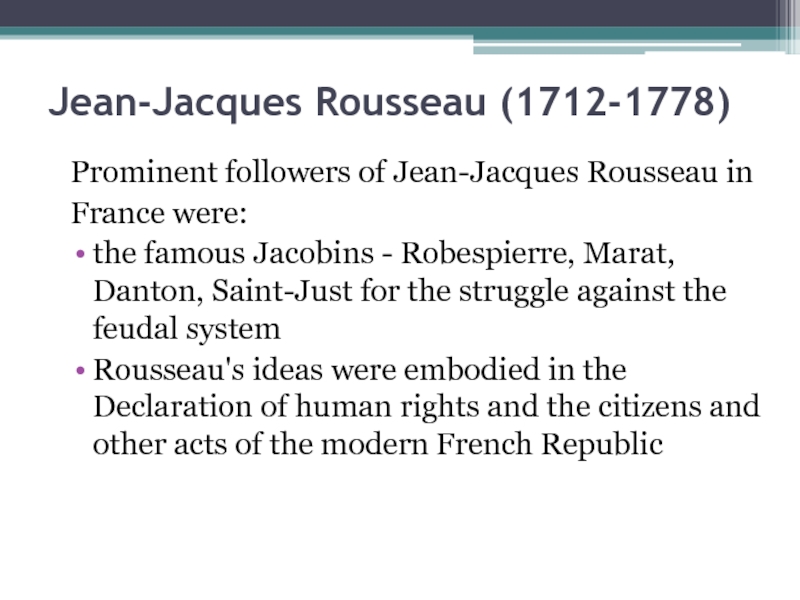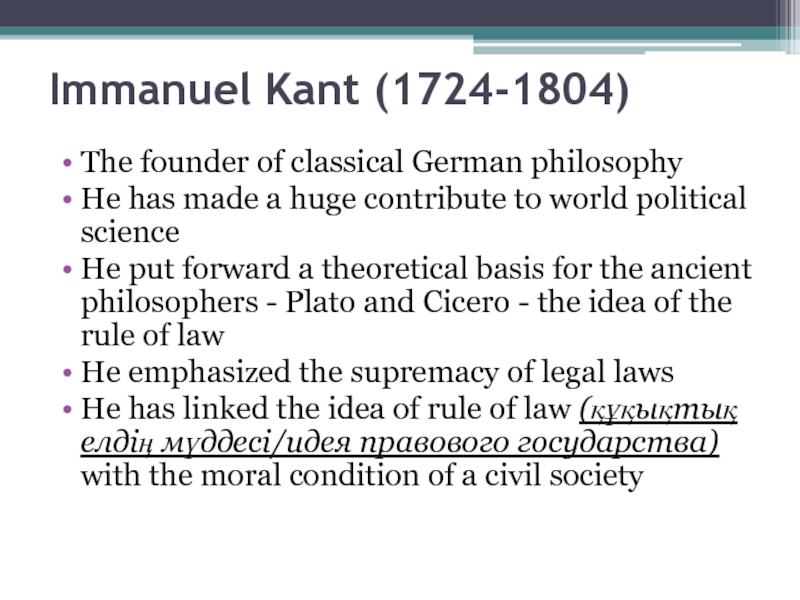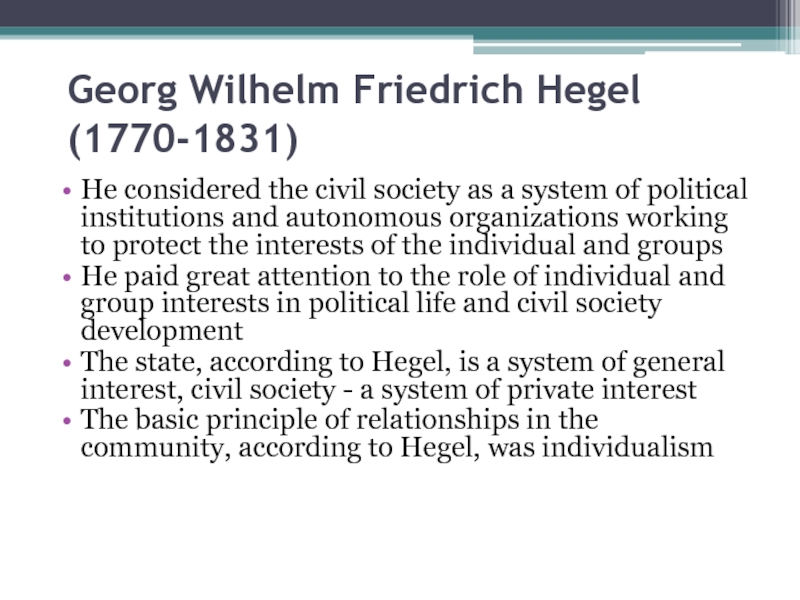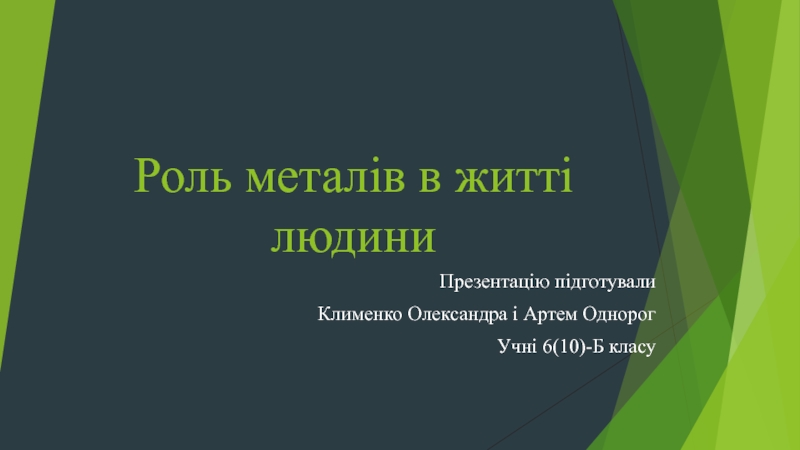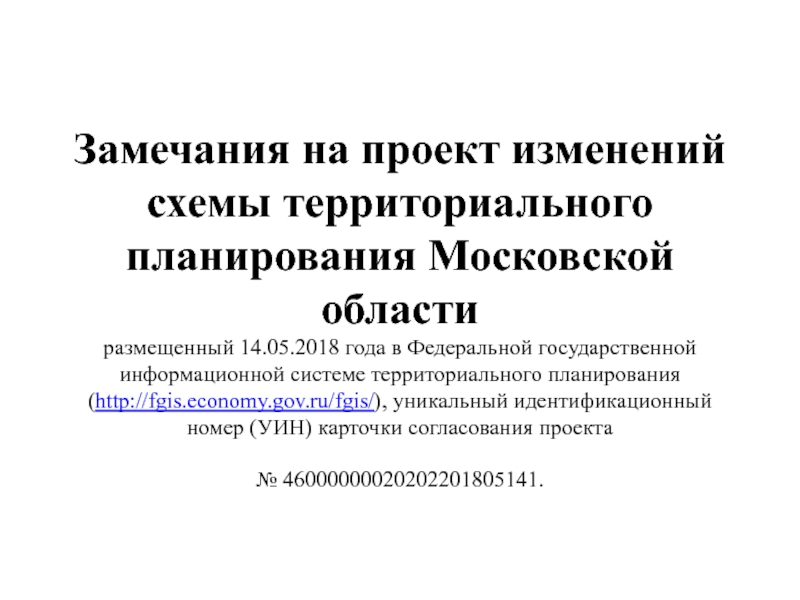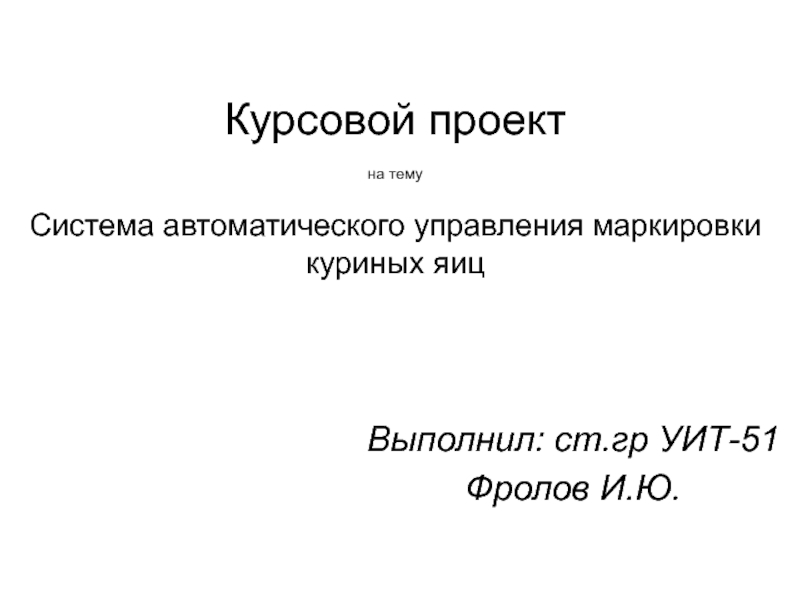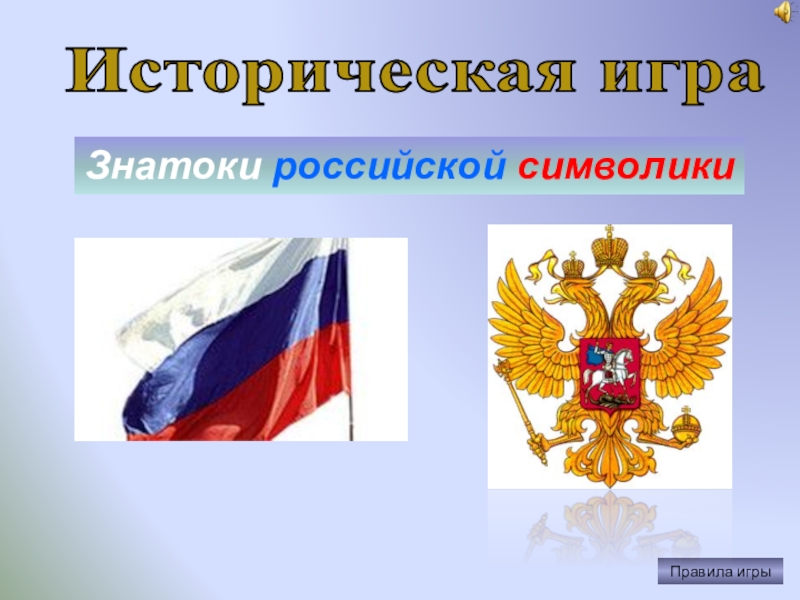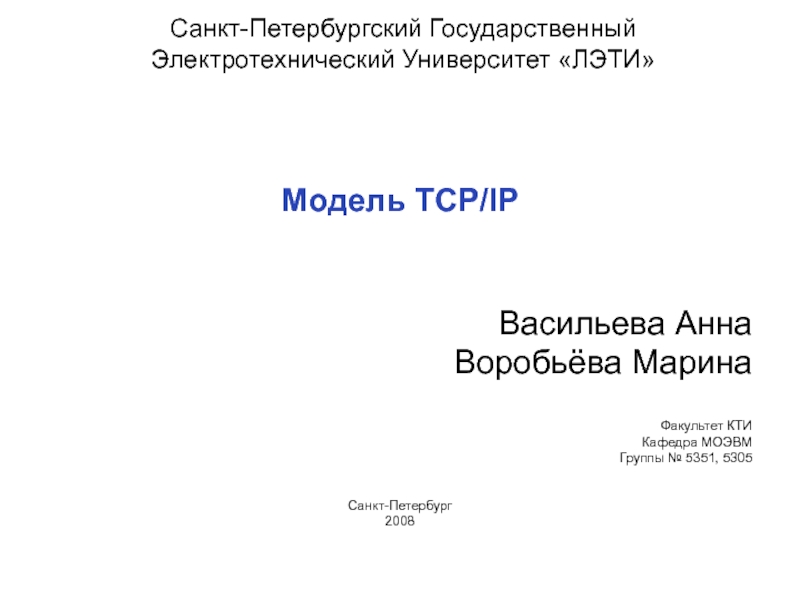Разделы презентаций
- Разное
- Английский язык
- Астрономия
- Алгебра
- Биология
- География
- Геометрия
- Детские презентации
- Информатика
- История
- Литература
- Математика
- Медицина
- Менеджмент
- Музыка
- МХК
- Немецкий язык
- ОБЖ
- Обществознание
- Окружающий мир
- Педагогика
- Русский язык
- Технология
- Физика
- Философия
- Химия
- Шаблоны, картинки для презентаций
- Экология
- Экономика
- Юриспруденция
THE DEVELOPMENT OF POLITICAL THOUGHT Part II
Содержание
- 1. THE DEVELOPMENT OF POLITICAL THOUGHT Part II
- 2. Content of the lecture:
- 3. Thomas Hobbes (1588-1679) The most prominent
- 4. Thomas Hobbes (1588-1679) He believed that:State
- 5. John Locke (1632-1704)He developed the concept of
- 6. Charles Louis Montesquieu (1689-1755) He added
- 7. Epoch of EnlightenmentHobbes, Locke and Montesquieu were
- 8. Francois Marie Arouet - Voltaire (1694-1778)A
- 9. Francois Marie Arouet - Voltaire (1694-1778)
- 10. Jean-Jacques Rousseau (1712-1778)The most popular French Enlightenment
- 11. Jean-Jacques Rousseau (1712-1778)He offered to negotiate a
- 12. Jean-Jacques Rousseau (1712-1778)Prominent followers of Jean-Jacques Rousseau
- 13. Immanuel Kant (1724-1804)The founder of classical German
- 14. Georg Wilhelm Friedrich Hegel (1770-1831)He considered
- 15. Скачать презентанцию
Content of the lecture: Thomas Hobbes (England)John Locke (England)Charles Louis Montesquieu (France)Francois Marie Arouet - Voltaire (France)Jean-Jacques Rousseau (France)Immanuel Kant (Germany)Georg Wilhelm Friedrich Hegel (Germany)
Слайды и текст этой презентации
Слайд 2
Content of the lecture:
Thomas Hobbes (England)
John Locke (England)
Charles Louis Montesquieu
(France)
Wilhelm Friedrich Hegel (Germany)Слайд 3
Thomas Hobbes (1588-1679)
The most prominent political thinker of modern times
A strong supporter of the government and the absolute monarchy
He
believed that citizens are able to do on your own that is not prohibited by lawСлайд 4
Thomas Hobbes (1588-1679)
He believed that:
State should act as a rule
State
should deal with educational activities
State should develop production (agriculture, shipping,
trade)Government should force people to physical work
Слайд 5John Locke (1632-1704)
He developed the concept of separation of powers
He
offered to share power between the legislative, executive and federal
He
put forward the position of the duty of all citizens, without exception, to obey (бағыну/подчиняться) the laws of societyHe put forward the idea of personal freedom, the right to life and property
This was due to one of the foundations of the ideology of bourgeois liberalism
Слайд 6Charles Louis Montesquieu
(1689-1755)
He added a theory of the
separation of powers: with the legislative, executive and judicial
He combined
the concept of freedom with the idea of securing the constitutional mechanism of separation of powersThe idea of freedom, civil rights and separation of powers, based Montesquieu, have been embodied (еңгізу/закреплять) in the constitutions of France, the U.S. and many other countries
Слайд 7Epoch of Enlightenment
Hobbes, Locke and Montesquieu were among the first
members of the ideological and political movement, known as "Enlightenment"
This thinkers have criticized the feudal order and promote the interests of the emerging bourgeois class
They believed in the potential of the human mind and the science in the restructuring of society
They have done a lot to free science from the power of religion and the use of scientific achievements
Enlightenment thinkers made great contributions to the development of both the natural and social sciences
Слайд 8Francois Marie Arouet - Voltaire
(1694-1778)
A prominent critic of the
feudal system
Outstanding representative of the Enlightenment in France
For criticizing the
government, he twice was sent to the BastilleHe spent a lot of time abroad
Voltaire's ideas on policy and law played a major role in the future bourgeois revolution in France
Слайд 9Francois Marie Arouet - Voltaire
(1694-1778)
Voltaire defended the principles
of:
Equality
Freedom
Private property
Voltaire at the same time was refusing to poor
people in the equality of political rightsSpeaking against absolutism, he was a supporter of the power of the enlightened monarch
Слайд 10Jean-Jacques Rousseau (1712-1778)
The most popular French Enlightenment thinker
He has represented
the interests of the petty (ұсақ/мелкий) bourgeoisie and the peasantry
He
railed (қарсы шығу/выступать против) against the private propertyHe criticized the feudal system
He criticized the growing capitalism
He opposed industrial civilization lifestyle free landowners
Слайд 11Jean-Jacques Rousseau (1712-1778)
He offered to negotiate a new social contract
that would represent an equal association of free individuals, or
a republicHe was a proponent of direct democracy in which all citizens have the opportunity to influence public policy
He insisted on the right of citizens to participate in making laws.
Rousseau's ideas of equality and democracy contributed to the awakening of the revolutionary process in France
Слайд 12Jean-Jacques Rousseau (1712-1778)
Prominent followers of Jean-Jacques Rousseau in
France were:
the famous
Jacobins - Robespierre, Marat, Danton, Saint-Just for the struggle against
the feudal systemRousseau's ideas were embodied in the Declaration of human rights and the citizens and other acts of the modern French Republic
Слайд 13Immanuel Kant (1724-1804)
The founder of classical German philosophy
He has
made a huge contribute to world political science
He put
forward a theoretical basis for the ancient philosophers - Plato and Cicero - the idea of the rule of lawHe emphasized the supremacy of legal laws
He has linked the idea of rule of law (құқықтық елдің мүддесі/идея правового государства) with the moral condition of a civil society
Слайд 14Georg Wilhelm Friedrich Hegel
(1770-1831)
He considered the civil society as
a system of political institutions and autonomous organizations working to
protect the interests of the individual and groupsHe paid great attention to the role of individual and group interests in political life and civil society development
The state, according to Hegel, is a system of general interest, civil society - a system of private interest
The basic principle of relationships in the community, according to Hegel, was individualism
